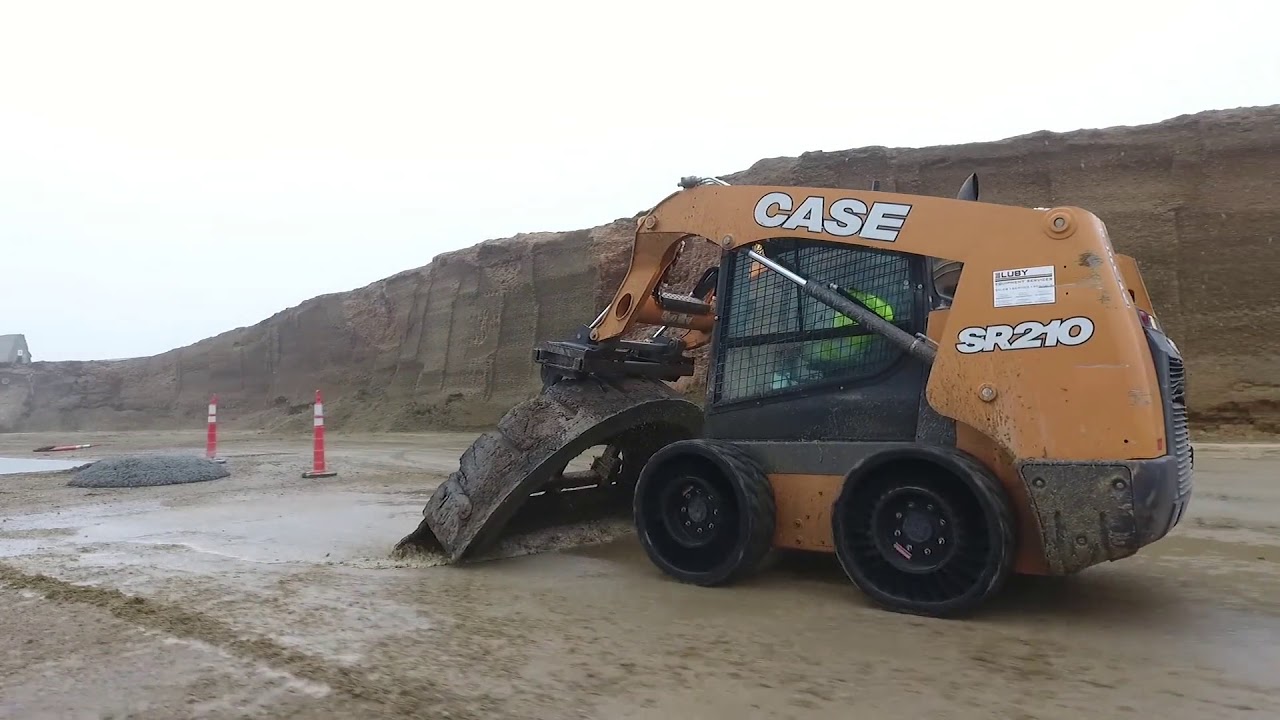AIRLESS RADIAL TIRES EXTEND TIRE LIFE, IMPROVE OPERATOR COMFORT FOR LA BELLE DAIRY
While solid skid steer tires are generally seen in demolition, waste and other heavy-duty construction applications, La Belle Dairy has outfitted its entire skid steer fleet with solid tires to eliminate downtime related to flats with pneumatic tires.
La Belle Dairy (La Belle, Missouri) relies on a fleet of skid steer loaders for a variety of tasks around the farm — from cleaning out bedding and pushing feed, to construction projects and site improvement. These machines are the ultimate utility player on the farm — capable of handling and quickly switching between numerous attachments.
“We have two SR210s, and four SV175s. And each one of those is designated for a different part of our dairy applications,” says Luman Wilkerson, operations manager, La Belle Dairy. “One 210 we use to clean out the mangers in the morning, to clean out the feed that the cows don't eat. Then we have the other one fill in or do a lot of cleanup, or move palettes and materials around. And then the [SV175s] we use for bedding and cleaning the walkways for the cows.”
While solid skid steer tires are generally seen in demolition, waste and other heavy-duty construction applications, La Belle Dairy has outfitted its entire skid steer fleet with solid tires to eliminate downtime related to flats with standard pneumatic tires.
“We use a lot of the solid tires because we are in a lot of compact areas, a lot of concrete… and we have a lot of issues with getting flat tires with the pneumatic tires. That causes downtime,” says Wilkerson.
The dairy was supplied a set of Michelin X Tweel SSL All Terrain airless radial tires by CASE and local dealer Luby Equipment with a recent skid steer purchase. The Tweel is one single unit, replacing traditional tire/wheel/valve assemblies. There is no need for wheel/tire mounting equipment, and there is no air pressure to maintain once each tire is bolted on. Wilkerson and his operators noticed an operational difference almost immediately.
“With the solid rigid tires, they're a lot harder on the guys. It wears on your back and shoulders driving across long distances and operating for long periods of time. They're a little rougher ride whereas the Tweels are quite a bit softer. They take a lot of the impact out.”
The unique design of the Tweel provides great lateral stiffness, while resisting damage and absorbing impacts. Additionally, the energy transfer within the high-strength poly-resin spokes reduces the “bounce” associated with pneumatic tires.
“After using the Tweels, they're a lot better for the machine,” says Wilkerson. “They take a lot of absorption from the impacts or shaking of your buckets or moving around. Also, transporting across long distances on a dairy … it's easier on the machine and easier on the operators. Makes a lot more comfortable drive, yet it still gives us that advantage of not having flat tires… and they still get great traction.”
While many factors affect machine maintenance and uptime, Wilkerson also noticed a correlation between fewer maintenance events on the skid steer outfitted with the Tweels versus machines outfitted with standard solid tires.
“We seem to have a little less maintenance on the ones with Tweels just because of the shock absorption, so that it's not rattling the machine as much. On the ones with the solid, rubber tires, we had problems with bolts coming loose here and there, hydraulic fittings issues, motor mounts, our fans would sometimes rock loose into the radiator shrouds and stuff like that. These Tweels seem to alleviate some of that issue.”
Sustainability is also a driving factor for the dairy farm — its entryway sign reads “Sustainability Starts Here” — and the Tweel helps support that mantra featuring a wear life that is two-to-three times that of a pneumatic tire at equal tread depth.
“We had looked at them before — didn’t really think they’d be something that’d be great, but after having a loader with those tires on it, they seem to be a really good tire and help out a lot,” concludes Wilkerson. “You see a lot of improvements for your machine and for your operator that you wouldn’t know just thinking about tire versus tire.”
Callout: About La Belle Dairy
La Belle Dairy is owned by Milk Source LLC and milks about 5,200 cows. Milk Source purchased the former Heartland Dairy in 2017 and renamed it after the local community. Major renovations include the installation of new rotary parlors, new headlocks, extending the feed pad, and upgrading storm water drainage.
